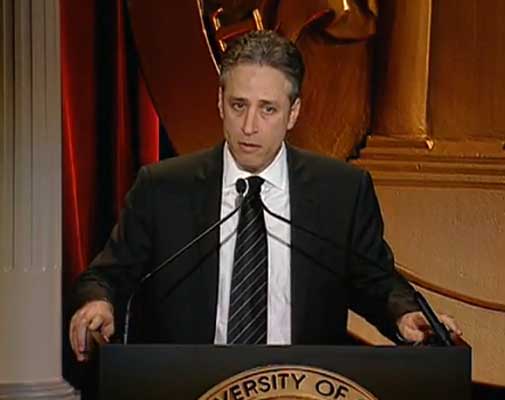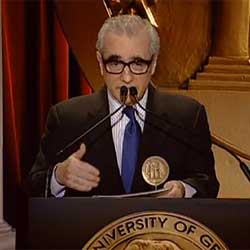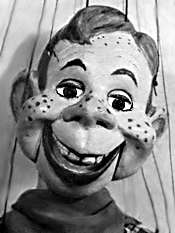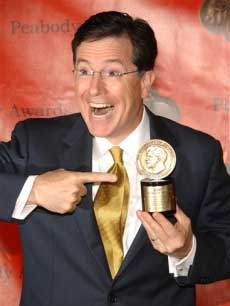
I'll never forget the time George Foster Peabody made Jon Stewart cry.
Well, in manner of speaking. It was back in May 2006. Mr. Peabody, by then, had been gone from this mortal coil about 68 years. Stewart, the incorrigibly irreverent host of The Daily Show, was on stage at the Waldorf-Astoria's grand ballroom, overseeing the presentation of the awards that bear the late, great philanthropist's name.
Twice a Peabody winner himself, Stewart was rocking the hall. He was boogalooing up and down that fine line between mischief and disrespect, kidding even big-name recipients like Martin Scorsese. But close to the end of the ceremony, after presiding over clips from winners that ranged from Hurricane Katrina coverage to the gut-punch cop show The Shield to a made-for-cable movie about a South African mother with AIDS, Stewart almost lost it...
Mr. Cool had to step back from his podium, swallow, and compose himself before he could finish up.
Moments like that -- Peabody moments, we like to call them at the program's headquarters on the University of Georgia campus -- happen every year. If it's not the emcee getting misty, it's a recipient like Lost creator Damon Lindelof confessing in his acceptance speech that he almost didn't fly in for the ceremony because of bad weather, but that his wife had told him, "This is the Peabody Awards. If you don't go, I will slap your face." And then he thanked her for her wise counsel in front of the thousand people in attendance.
What happens, you see, is that the creativity and social significance of the year's recipients slowly adds up, and reaches a sort of cumulative critical mass that can be humbling, whether you're a reporter at a radio station in Fargo or the highly paid creator of a hit network show.

(Click HERE for a clip of Jon Stewart introducing, then cleverly reacting to, one Peabody winner at the 2006 awards: Martin Scorsese, who won for his PBS American Masters biography, No Direction Home: Bob Dylan.)
What happens is this: recipients, emcees and audience members alike become palpably aware that a Peabody Award, the oldest in electronic media, is indeed the hardest to win. They are reminded that the awards go to not just technically excellent work, but work that addresses issues and ideas in a thoughtful manner, that challenges the mind or that breaks new ground.
They are reminded of just how good TV, radio and the Internet can be. They are reminded that the George Foster Peabody Awards are not only a gesture of respect, but a double-dog-dare.
It might have turned out differently. In 1938, the National Association of Broadcasters was looking to generate more respect for its members -- and, frankly, more publicity -- when its executive leadership asked Lambdin Kay, general manager of Atlanta's WSB-AM, to dream up a prize for radio that would have the cache that the Pulitzer does in the print world.
if it had been strictly an in-house industry trophy, what Kay came up with might have been only a bit more prestigious than, oh, a Golden Globe. But WSB's continuity editor, Lessie Smithgall (a University of Georgia graduate, who recently celebrated her 100th birthday), hooked Kay up with her mentor, John Drewry, the esteemed dean of UGA's Grady School of Journalism.
Once they'd outlined the award and obtained the use of the late Mr. Peabody's name (and a little start-up money) from his family, Kay and the NAB left it to Drewry to operate. That independence has been crucial to the prestige the award quickly acquired.
At the first ceremony, a 1941 shindig focused on 1940s radio fare, awards went to stations in Cleveland, Cincinnati and Columbia, Missouri, for public service, and to CBS Radio's Elmer Davis for his intrepid reporting. In 1942, Peabody winners ranged from The Man Behind the Gun, a drama, to Our Hidden Enemy, Venereal Disease, a documentary produced by KOAC Radio in Corvalis, Oregon. The unique Peabody emphasis on excellence without regard to genre was already evident.

The first awards to that new-fangled television thing didn't happen until 1948, when Peabodys went to ABC's Actor's Studio, an early experiment in live drama that involved the likes of John Steinbeck and Elia Kazan, and an NBC children's program called Howdy Doody. Again, we see that omnivorous purview that is still a Peabody hallmark.
At the 70th annual Peabody ceremony coming up Monday (May 23) in New York, Larry King will be the emcee. He's the latest in a long line of past Peabody winners -- Stewart, Walter Cronkite, Lesley Stahl, Brian Williams, Diane Sawyer -- who volunteer their services.
This year, the 38 Peabody recipients range from a jolting radio report about our flawed bail bond system to a documentary about guerilla video journalists in Burma to FX's Justified, a sort of modern-day Gunsmoke set in Appalachia.
Gunsmoke, by the way, never won a Peabody. Neither did I Love Lucy or The Andy Griffith Show, two other long-running oldies now widely considered TV classics. Oversights happen.
It wasn't that the Peabodys were snooty in the early days -- well, OK, maybe they were, just a little -- but that the early emphasis was heavily on news, education and public service. With a few exceptions, like Wally Cox's Mister Peepers and Lassie (yes, Lassie but no Lucy), the entertainment series honored by the Peabody board tended to be higher-brow fare, such as Omnibus and The Bell Telephone Hour.
But the Peabodys steadily evolved, along with the electronic media they honor. Entertainment programming began to get more attention when it became more connected to reality in the 1970s, the heyday of great Norman Lear and MTM Productions comedies.
Now, more than a decade after a Peabody board honored HBO's The Sopranos for exploring "the moral complexity of modern American life," it's not a big shock when a fresh configuration of the 16-member group cites a South Park, as well as an oral-history of the Civil Rights movement or a 30 Rock, along with a Roanoke TV station's remarkably calm live reporting of the Virginia Tech shooting spree.
In recent years, the Peabodys have averaged about one thousand TV, radio and Web entries -- news coverage, documentaries, entertainment, public-service campaigns, children's shows -- from as close by as Atlanta and as far away as Hong Kong and Berlin. From these, the board reaches unanimous agreement on only about three dozen.

After The Colbert Report was honored in 2007, a jubilant Stephen Colbert informed his Comedy Central audience that the Peabody is a "big deal" because it's "like an Oscar wrapped in an Emmy inside a Pulitzer."
For once, Colbert wasn't being hyperbolic. He could have noted that it's like an Oscar wrapped in an Emmy inside a Pulitzer, preserved in amber with a Good Housekeeping Seal of Approval affixed and blessings from the Dali Lama and Oprah Winfrey.
It is a big deal.
--
Note: Noel Holston wrote about television and popular culture for The Orlando Sentinel, the Minneapolis Star Tribune and New York's Newsday before joining the Peabody Awards staff in 2006. He traces his awareness of the award to 1957, when one of his favorite TV shows, Captain Kangaroo, won its first Peabody and for weeks displayed the medallion at the conclusion of each broadcast. For more about this year's Peabody recipients, visit the official Peabody website HERE.